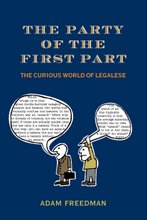Not exactly a word, granted, but an abbreviation typically found at the beginning of an affidavit or other sworn statement, when listing the venue of the affidavit: "State of New York, County of New York: ss."
Unfortunately nobody can remember exactly what those two little letters stand for. They come from an old system of Latin notation known as “court hand," so it's safe to say that they stand for something in Latin. The abbreviation is sometimes said to be short for scilicet (one may know); but other suggestions include subscripsi, sans, sacerdotes, sanctissimus, Spiritus Sanctus, and sunt. Black’s Law Dictionary will only go so far as to say that it is “commonly . . . supposed to be a contraction of ‘scilicet’.” And yet, no self-respecting lawyer will draft an affidavit without it.





